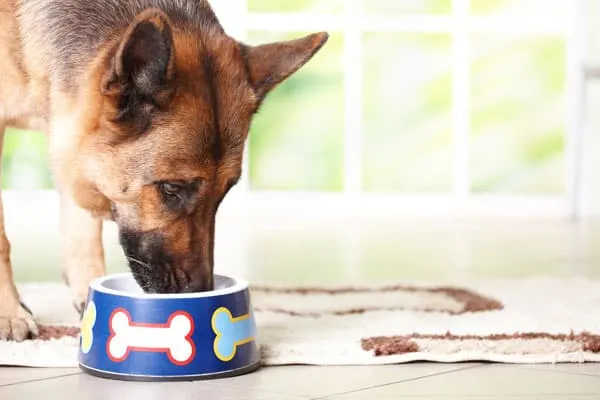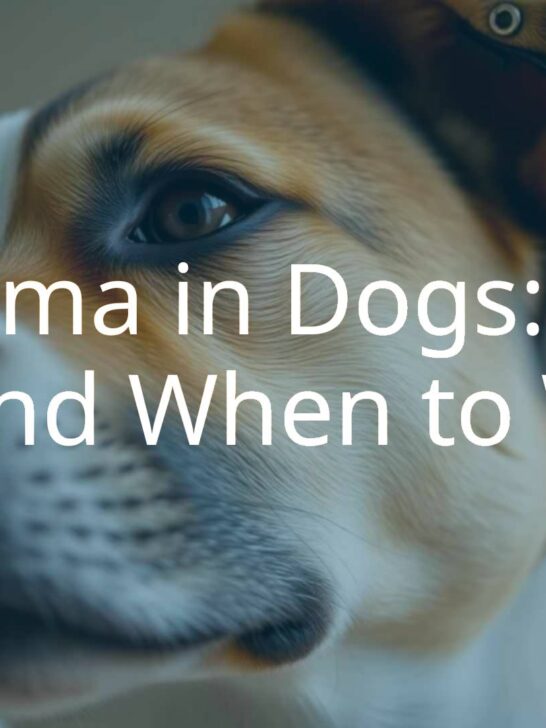Are German Shepherds Allergic to Chicken: Find Out What Is Causing Your GSD’s Allergy
Modern pet dogs are descended from ancient wolves. Wolves, as everyone knows, eat meat for their diet.
So it just makes sense that you would feed your German Shepherd dog chicken and other types of animal protein.
After all, why would a German Shepherd be allergic to food like chicken when animal protein is their primary food source?
This is a mystery far too many dog owners today are having to tackle.
The truth is, more and more German Shepherds are developing food allergies. Sometimes, those food allergies can include an allergy to chicken.
What causes German Shepherds to become allergic to chicken and other foods that are a staple part of the canine diet?
That is exactly what we are going to talk about in this article.

Why German Shepherds Get Food Allergies: What the Veterinarians Say
According to Web MD for Pets, as many as 10 percent of all companion dogs may develop food allergies at some point in life.
That is a lot of dogs suffering from food allergies!
Some dogs also develop a condition known as food intolerance, which is caused by something different.
As VCA Animal Hospital explains, food intolerance is when your dog has an adverse reaction to food.
But trying to figure out whether your dog has a food allergy to chicken or your German Shepherd has a food intolerance that includes chicken can be really challenging, especially because the symptoms can be so similar.
Food intolerance is caused primarily by these factors:
- Additives or drugs in food (such as antibiotics or too much of a vitamin or mineral).
- Lactose (carbohydrate) intolerance.
- Food poisoning caused by eating bad or spoiled food.
- Eating non-food items (toys, socks, cardboard, et al).
Food allergies, conversely, are most commonly triggered by one simple factor: genetics.
Yes, if your German Shepherd is found to be allergic to any foods, it is quite likely that your dog’s parents were too.
In fact, certain breeds of purebred dogs, including the German Shepherd breed, have a higher incidence of genetic food allergies than other dog breeds.
Sometimes the surrounding environment and the internal (intestinal) environment can also cause food allergies by changing how the immune system perceives and responds to threats.
Related: Can You Feed Your Dog Chicken And Rice Every Day?
Why Would a German Shepherd Become Allergic to Chicken?
Chicken is one of the hands-down most common and most popular ingredients in modern dog foods.
Dog kibble, wet dog food, semi-moist dog food, and dog treats are commonly made with chicken.
And chicken is added to dog foods in many forms, including whole meat chicken, organ meats, chicken meal, chicken by-products, and chicken by-product meal.
This can get very confusing very quickly!
It can also add up to a lot of time spent reading dog food and treat labels to try to figure out if your dog can eat it or not.
When an ingredient is as popular as the chicken, you might be scratching your head trying to figure out why your German Shepherd would ever be allergic to it.
Surely the dog food manufacturers would leave out an ingredient that so many dogs are allergic to?
But not all dogs have a genetic predisposition to developing poultry allergies.
And some dogs are allergic to all poultry products while other dogs are only allergic to chicken but can eat turkey or duck without any problem.
Antibiotic additives get passed along to your dog
Because chicken is so popular and so plentiful and readily available, chicken companies want to breed as many chickens as they can as quickly as possible so they can make more sales.
For this reason, chickens are often fed powerful antibiotics along with their feed.
The antibiotics are given to try to prevent the chickens from developing any diseases as they grow up.
But this also means that the resulting chicken meat or meal will contain traces of those antibiotics, as this recent research study explains.
Antibiotics, when used properly, can help the body recover from and fight off infection successfully.
But antibiotics are not designed to be taken on a preventative basis because the body can build up a tolerance over time.

Genetic allergy to proteins and amino acids in poultry
As the Drake Center for Veterinary Care points out, most dogs that are going to develop an allergy to poultry that stems from genetic causes will show symptoms by age two.
In this case, your GSD’s immune system doesn’t recognize certain proteins and amino acids in poultry as “friendly” food.
The immune system overreacts and tries to mount a defense and your dog gets allergy symptoms as a result.
Common Symptoms of a Canine Chicken Allergy in GSDs
If your German Shepherd does start to develop an allergy to chicken in any form, these are the most common warning signs you are likely to see.
- Licking paws or biting at paws and skin.
- Scratching ears or skin against a hard surface.
- Hair falling out.
- Irritated skin.
- Wheezing or sneezing.
- Digestive disturbance.
- Gas, constipation, or diarrhea.
- Recurrent skin infections.
It can be hard to watch your dog feeling so uncomfortable. You may feel mystified at first about what could be causing the problem.
This is especially the case if your dog has been eating the same food for a long time because you might not suspect the food at all.
When you see symptoms that look like they could be allergies and you can’t find any cause, you should bring your German Shepherd in to be examined by your veterinarian.
See also: Do German Shepherds smell?
How Chicken Allergies in German Shepherd Dogs Are Diagnosed
From this point forward, the path to an accurate diagnosis and treatment is actually quite similar to how food allergies are diagnosed in people.
The first step is typically one of two approaches: either to do allergy testing or to try an elimination diet, or both.
As this helpful YouTube video from a veterinarian explains, once a chicken allergy is strongly suspected, trying a different diet that does not contain any chicken to see if your GSD’s symptoms improve is an easy way to see if your dog’s health issues are food-related.
Allergy testing may require skin tests, urine tests, blood tests, or a combination of these.
If your veterinarian is not sure if your dog’s symptoms are related to food or another type of allergen, allergy testing will probably be done first.
Otherwise, many veterinarians now try an elimination diet first to see if that solves the problem.
What Is a Good Elimination Diet for a German Shepherd?
As Modern Dog Magazine points out, dogs today are most likely to develop allergies to beef, dairy, wheat, and poultry.
Dogs are least likely to develop allergies to fish or rabbits.
So one of the best ways to start your GSD on an elimination diet is to switch your dog’s food to a fish or rabbit-based protein source.
However, remember that sometimes a dog’s digestive system can also be disrupted when their food is changed.
This can be confusing when you suddenly see more symptoms developing or your dog’s existing symptoms getting worse.
To minimize digestive disruption from changing your dog’s food, try to phase it out over a week-long period.
Start with 90 percent of your dog’s old food and 10 percent of the new chicken-free food.
Then portion the food out so that by the eighth day, you are feeding 100 percent of the new food only.
Also, be very careful to read the ingredients list on the new food in detail so you can catch any “hidden” chicken or poultry ingredients such as chicken by-products or meal.
And just for good measure, be sure the food you choose for your GSD is free from all other known allergens like wheat, dairy, and beef.
Always ask your veterinarian for guidance if you are having trouble selecting a new food.
It may take a week or longer after you are feeding only the new elimination diet to see any lessening of symptoms.
If you don’t see any lessening of symptoms after a week or whatever period of time your dog’s veterinarian sets, it is time for allergy testing.
When your dog goes on an elimination diet, you will need to stop feeding anything else, including treats, because you won’t know at first exactly what is causing the allergy in your GSD’s food.

Resolving Chicken Allergies in Your German Shepherd
For mild suspected food allergies like an allergy to chicken, simply switching your German Shepherd to a new hypoallergenic food may be enough to help your dog start feeling better.
But if your GSD is experiencing a more serious or severe reaction, there are other things your veterinarian may recommend, like administering medications to block immune system over-reaction to poultry proteins.
Once you find the right diet, your German Shepherd dog should start to feel better very quickly.
Related reading: How To Handle German Shepherd Eye Boogers
















